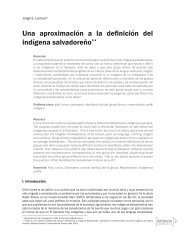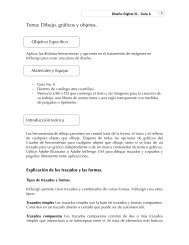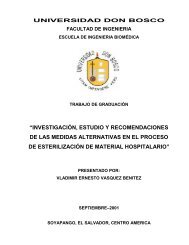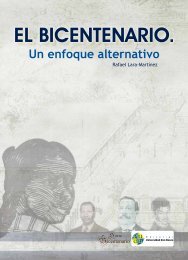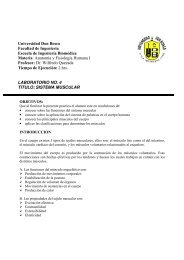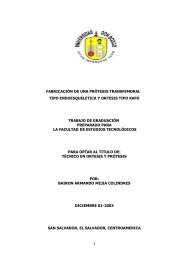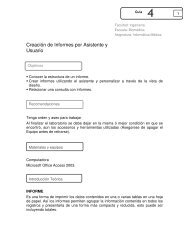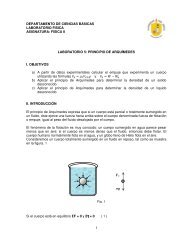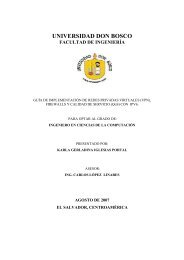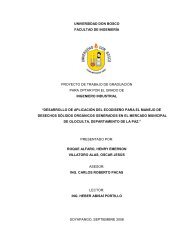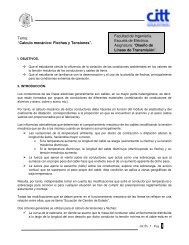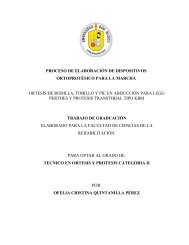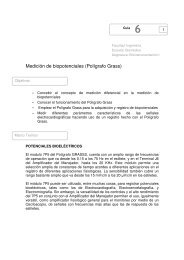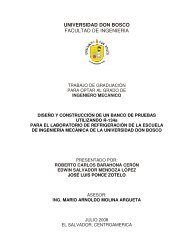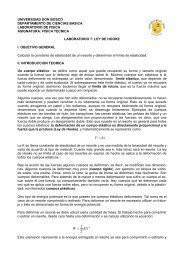cuentos de barro - DSpace Universidad Don Bosco
cuentos de barro - DSpace Universidad Don Bosco
cuentos de barro - DSpace Universidad Don Bosco
You also want an ePaper? Increase the reach of your titles
YUMPU automatically turns print PDFs into web optimized ePapers that Google loves.
Hundidos hasta las piernas, aún<br />
empujaron. Luego se metieron <strong>de</strong>ntro<br />
y se <strong>de</strong>jaron llevar por el tranquil <strong>de</strong>l<br />
agua parada. Era el cambio <strong>de</strong> marea;<br />
las corrientes que entraban al estero,<br />
fatigadas <strong>de</strong> ir buscando mundo,<br />
<strong>de</strong>scansaban un momento, antes<br />
<strong>de</strong> regresar al mar abierto. Entonces<br />
el peje 88 abismado venía arriba,<br />
flor<strong>de</strong>aguando, y buscaba la calma <strong>de</strong><br />
las ramazones y <strong>de</strong> los bancos. Ligeros<br />
colazos <strong>de</strong> zafiro indicaban ya el punto<br />
<strong>de</strong>l agua. Las sombras rojizas <strong>de</strong> los<br />
parvos pasaban, esquivando el peligro,<br />
avisados por el lánguido paleteo <strong>de</strong>l<br />
canalete.<br />
En fraterno silencio los indios cruzaban<br />
el agua como si volaran entre dos<br />
cielos. En la proa, ávida <strong>de</strong> espacio, el<br />
uno empujaba con la pértiga negra y<br />
larga que subía y bajaba rítmicamente,<br />
sincronizando con el manosear <strong>de</strong>l<br />
canalete, que el otro indio manejaba<br />
en la popa, acurrucado y friolento. En<br />
el centro <strong>de</strong>l bote el chucho, sentado,<br />
miraba tímidamente los cacharros <strong>de</strong>l<br />
cebo.<br />
—¡Qué friyo, vos!...<br />
—¡Ajú!...<br />
—¿Vamos al ramazal <strong>de</strong> la bocana?<br />
—Como quiera, mano.<br />
45<br />
Wading into the water, they continued<br />
to push. Then, they climbed in the boat<br />
and let the tranquil, still waters carry<br />
them away. Looking for a place to go,<br />
the fatigued currents, created by the<br />
change of ti<strong>de</strong>s, entered the marsh.<br />
They rested a little, before rejoining the<br />
open sea. A <strong>de</strong>ep-water fish was coming<br />
from a distance, navigating through the<br />
water lillies, looking for the calm waters<br />
at the banks un<strong>de</strong>r the branches of the<br />
mangrove trees. Spinning sapphire<br />
whorls indicated that the time to fish<br />
had come. The reddish shadows of<br />
the barvo fish passed by dodging the<br />
danger, warned by the languid stir of<br />
the short paddle.<br />
In fraternal silence, the peasants<br />
crossed the water as if they were flying<br />
between two skies. From the spacious<br />
bow, one pushed with a long black<br />
pole that rhythmically went up and<br />
down, synchronized with the pull of the<br />
paddle, that the other peasant, cold,<br />
and all curled up in the stern handled.<br />
The dog was sitting in the middle of the<br />
boat furtively eying the pieces of bait.<br />
“It’s cold, man.”<br />
“Yup.”<br />
“Should we head towards the branches<br />
by the estuary?”<br />
“It’s up to you, pal.”<br />
88. Peje: Pez. En <strong>Don</strong> Quijote, Tomo II, Capítulo XVIII se usa “peje Nicolás” como una figura mítica. (155).<br />
Observar: lat. piscis, it. pesce, port. peixe, gal. pèije hasta llegar a “peje” y a “pez”.



